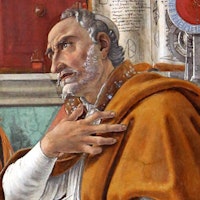When we choose to sin, what we want is to get some good or get rid of something bad. The lie is in this, that what is done for our good ends in something bad, or what is done to make things better ends by making them worse.
Saint Augustine

When We Choose
Topic: Overcoming Adversity
“When we choose to sin, what we want is to get some good or get rid of something bad. The lie is in this, that what is done for our good ends in something bad, or what is done to make things better ends by making them worse. Why this paradox, except that the happiness of man can come not from himself but only from God, and that to live according to oneself is to sin, and to sin is to lose God?”
Augustine of Hippo (13 November 354 – 28 August 430), also known as Saint Augustine, was a theologian and philosopher of Berber origin and the bishop of Hippo Regius in Numidia, Roman North Africa. His writings influenced the development of Western philosophy and Western Christianity, and he is viewed as one of the most important Church Fathers of the Latin Church in the Patristic Period. His many important works include The City of God, On Christian Doctrine, and Confessions.
Early life and conversion
Augustine was born in Tagaste, Numidia (modern Souk Ahras, Algeria), to a pagan father and a Christian mother. He was educated in Tagaste and Carthage, where he studied rhetoric. In his youth, he was drawn to the eclectic Manichaean faith, and later to the Hellenistic philosophy of Neoplatonism. After his conversion to Christianity and baptism in 386, Augustine developed his own approach to philosophy and theology, accommodating a variety of methods and perspectives.
Later life and legacy
Augustine was ordained a priest in 391 and was made bishop of Hippo in 396. He served as bishop for the rest of his life, during which time he wrote prolifically on a wide range of topics, including theology, philosophy, and politics. His writings had a profound impact on the development of Western Christianity, and he is considered one of the most important figures in the history of the Church.
Augustine's thought was shaped by his own personal experiences, as well as by the intellectual and religious currents of his time. He was deeply influenced by the writings of the apostle Paul, and he also drew on the insights of the Platonic tradition. Augustine's theology is characterized by its emphasis on the grace of God, the freedom of the will, and the importance of the Church. His writings have been interpreted in a variety of ways, and they continue to be studied and debated by scholars today.
Augustine is recognized as a saint in the Catholic Church, the Eastern Orthodox Church, the Lutheran Churches and the Anglican Communion. He is also a preeminent Catholic Doctor of the Church and the patron of the Augustinians. His memorial is celebrated on 28 August, the day of his death. Augustine is the patron saint of brewers, printers, theologians, and a number of cities and dioceses. His thoughts profoundly influenced the medieval worldview. Many Protestants, especially Calvinists and Lutherans, consider him one of the theological fathers of the Protestant Reformation due to his teachings on salvation and divine grace. Protestant Reformers generally, and Martin Luther in particular, held Augustine in preeminence among early Church Fathers. From 1505 to 1521, Luther was a member of the Order of the Augustinian Eremites.
In the East, his teachings are more disputed and were notably attacked by John Romanides, but other theologians and figures of the Eastern Orthodox Church have shown significant approbation of his writings, chiefly Georges Florovsky. The most controversial doctrine associated with him, the filioque, was rejected by the Eastern Orthodox Church. Other disputed teachings include his views on original sin, the doctrine of grace, and predestination. Though considered to be mistaken on some points, he is still considered a saint and has influenced some Eastern Church Fathers, most notably Gregory Palamas. In the Greek and Russian Orthodox Churches, his feast day is celebrated on 15 June.
The historian Diarmaid MacCulloch has written: "Augustine's impact on Western Christian thought can hardly be overstated; only his beloved example, Paul of Tarsus, has been more influential, and Westerners have generally seen Paul through Augustine's eyes."
City of God
Wilson, Andrew, editor. World Scripture II. Universal Peace Federation, 2011, p. 269 [Saint Augustine, City of God 14.4].

Saint Augustine
Copyright © 2017 – 2024 LuminaryQuotes.com About Us

Saint Augustine, City of God 14.4